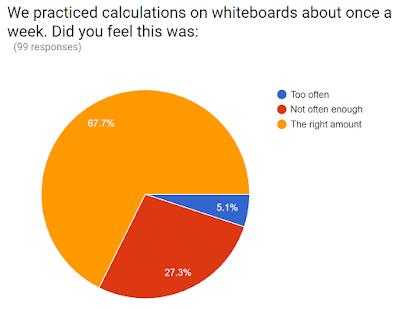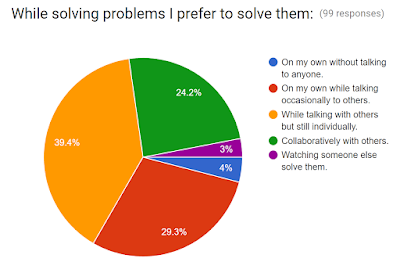Background
This
year has been a curricular experiment about homework in regular Physics classes
including approximately 240 students in seven sections. Two different
teachers, myself and Jon Brix, taught nearly identical curriculum. Students were given the following
descriptions and asked a series of questions via Google Form in April with the
instructions: “Please read the following descriptions and then answer each
question honestly. Constructive criticism will help me determine what I should
adjust about this process. Complaints without suggestions for change will not
be as helpful.”
Former format with homework:
Homework
was assigned most nights to be stamped the following day. Each day the homework
was reviewed and students self-corrected it. Students that did not complete it
before it was stamped are encouraged to complete it while it was reviewed.
Homework assignments could include textbook problems, reading textbook
sections, completing worksheets or finishing a lab. Ideally the homework did
not take more than 20 minutes a night. The homework was collected at the end of
each unit and checked for completion and stamps. Assignments missing stamps or
incomplete earned fewer points. Homework was 10% of the total grade.
Current format without homework:
Suggested
homework is supplied every night but is not required. Suggested homework may
include textbook problems, reading textbook sections, or completing worksheets.
The answers can be reviewed in class or via email upon request. Required
homework is occasionally assigned and stamped. Required homework is most often
completing in-class activities and rarely textbook problems or reading. Some
problems are done collaboratively in class on whiteboards; students work in
groups taking turns to solve them. Each week students take a short formative
assessment so that the students and I know how they are doing. If students do
poorly on the quiz they should consider completing more of the suggested
homework. These weekly quizzes are 10% of the total grade and graded for
accuracy.
Survey results
We did not track who took the survey so 99 (as of this posting) of over 200 students completed the survey. The full survey questions are available here. The results are shared below, with some reflection.
The majority of students prefer not having homework while about a quarter would have preferred to have homework. I was surprised at the 20% that said they wouldn't care either way.
Students were then offered to explain their choice for nightly homework or not. The full text of students responses is here.
Of the 54 students that liked not having homework I made a rough count of common themes in their responses:
23 mentioned that they learned the materials in class without additional help
2 said students are lazy
14 mentioned that it saved them time for their other classes or specifically said they had AP classes to focus on
16 said they liked having the option to do suggested homework if they needed it or that the option gave them responsibility
Of the 25 students that wished they had had homework a similar rough count revealed:
5 students said they would have liked to earn "easy" points for it
8 students said they need to do homework to learn material
13 students mentioned that without an incentive they would not do it
This came as no surprise to me. Depending on the assignment, I might ask the class, "Who would like to see the solutions to the suggested homework?" and I would get few hands. Sometimes no hands, which could mean students were self conscious and didn't want to admit that they were studious. Sometimes I still reviewed the assignment because I wanted the whole class to discuss the questions; other times I scrolled briefly through the rubric on a projector. When given the chance to respond (full text of students responses here) many mentioned they would have liked access to an answer key online to check their own work. Going forward I think that is a good idea.
Required homework was usually finishing a lab in class. These self-reported responses were pretty close to my observations in class.
This highlights perhaps the most frustrating parts of this new system. The suggested homework is there, every day, for students who need it. Yet the students that need it the most do not take advantage of it. The majority of students here felt doing more suggested homework would help them. Almost 90% of the students said that that it would have helped them or at least maybe it might have helped them.
When given the chance to respond many students admitted they didn't do the suggested homework that should have and would have like some kind of incentive to do it.
As a way of still assessing students' understanding and holding them accountable for learning the material we wrote weekly quizzes. They did not occur every week (in high school, rallies, programs, life, often gets in the way) but often enough to become routine. I was pleased to see that almost 90% of students thought that the weekly quizzes helped them figure out what to study or at least sometimes did.
When asked about the length of the quizzes 88 of the 99 said that they thought the length was appropriate. When asking about their confidence going into the test I tried to take into account anxiety about the content and about the assessment.
Please select any statements you agree with or describe you most of the time:
- (40/99) I was not anxious about the weekly quizzes because I was confident in my understanding.
- (22/99) I was anxious about the weekly quizzes because I was not confident in my understanding.
- (29/99) I was anxious about the weekly quizzes because I was worried they would bring down my grade.
- (22/99) I was not anxious about the weekly quizzes because I knew they didn’t drastically impact my grade.
- (22/99) I was anxious about the weekly quizzes because I am always anxious taking tests or quizzes.
- (8/99) I was not anxious about the weekly quizzes because I am never anxious taking tests or quizzes.
So a total of 73 reported feeling anxious about our weekly assessments for some reason . A few less, 62, reported not feeling anxious about the weekly assessments.
Given the wide variety of aptitude levels in our classes this was not a surprise. For some students, Physics is their toughest subject. For others it may be their only non-AP course. Our students' math levels vary from AP Calculus, AP Statistics and Multi-variable Calculus to our remedial math track.
The written responses to weekly quizzes varied greatly but one student saw them for what they were meant to be:
"I found the quizzes to closely resemble the textbook problems, this was a good way to motivate people to do the homework as it is direct practice for the quiz."
We were pleasantly surprised by the positive effects of whiteboard practice problems in class. "Whiteboarding" can mean many different things in education. We used large whiteboards so that students could collaboratively solve problems together in class. Certain problems were assigned and the teacher would circle the room checking their progress. We found that we were often just checking their final answers as they had worked together past the normal stumbling blocks. The conversations within groups about their own problem solving were wonderful, they worked through misconceptions and were able to refer back to previous work.
This was a concern in some classes as there may be a student that understood the topic and wanted to be "done." We strove to change this by saying that students have to pass the pen every problem so that one person would not solve them all. Sometimes we would put two boards out per table and groups were given the option to work in groups of four or two.
While solving problems with my group I felt:
It was not ok to make mistakes
1 - 1
2 - 7
3 - 15
4 - 20
5 - 56
It was ok to make mistakes and correct them
We were pleased to see that the whiteboarding helped students move towards a growth mindset. The majority of students felt that it was okay to make mistakes and correct them, often attributed to the temporary nature of whiteboards.
Again, we felt that this showed whiteboarding practice problems had been successful. We implemented the whiteboard problems in order to make-up for the calculation practice students would not be doing through homework. We often determined which problems to use by looking at old homework assignments and picking problems we really thought students needed to try in order to understand the concepts.
This surprised me considering the previous responses to whiteboarding problems, a format I would attributed to the green colored "Collaboratively with others" response above. Most students preferred a individually working on problems but talking for at least part of the time with others. A few students specifically responded that they would like more individual practice in the Think-Pair-Share format. One student suggestion I really liked suggested using four small whiteboards, one for each student, and then having students combine them. It is possible that while I wrote "while talking to others" to mean "talking to others about the problems I'm solving" that students interpreted it as being able to socially talk with their friends while working on problems.
Assessments changes
The multiple choice portion of our tests has been very similar to years past although more of the free response has been changed. We feel that we have increased the difficulty level of the free response, adding more questions about their labs and analyzing data to replace simpler "plug & chug" problems. We
cannot
directly compare test averages year to year because there are many variables:
I was gone on maternity leave twice in the last six years, did not teach
Physics one year and Brix has been teaching Physics for only three years. We
have also been changing much of our curriculum to better align with the Next
Generation Science Standards. Our impression has been that the test averages are similar to past years if not higher. The overall class averages have been higher than in years past by small amounts.
Reflections
Many of the student comments were
expected and not surprising given the nature of the age group we teach and the
competitiveness of current high school academics in our area. While we feel
this “No Homework Experiment” accomplished some of our goals it is not a “one
size fits all” pedagogy and a certain amount of differentiation is still
necessary. Both teachers have noticed that the lower level students that might have been at a B- or C+ before are up to a grade lower this year. This might be attributed to the 10% that used to be given for homework completion was based on completion (or corrected completion) and not accuracy their first time attempting it. We are inclined to think that these students would benefit more from practicing the concepts more by doing the suggested homework but since it is not required, they won't do it.
Next
Steps
We both intend to continue without
required nightly homework for regular Physics. Given student responses a few more
required assignments will be added and we are working on an incentive system
for students that should be taking advantage of the suggested homework system. We don't feel comfortable "requiring" the suggested homework if they are below a certain grade level as that complicates grading. Several students suggested making one assignment a week required which is something to consider and it might be enough to help the lower level students. Any and all suggestions about further encouraging struggling students are appreciated.
If any additional reflections are made before the end of the school year I will add to this post. If you have any specific questions feel free to send them my way.









